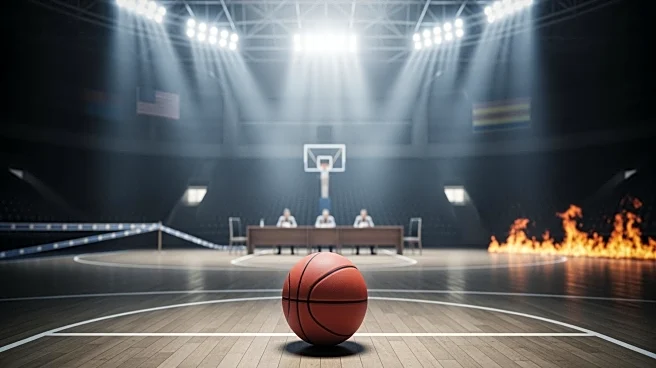What's Happening?
LeBron James' demeanor during the Los Angeles Lakers' season-opening loss to the Golden State Warriors has sparked discussions about his future with the team. Observers noted that James appeared detached and uninterested while sitting on the bench, leading
to speculation about his commitment to the Lakers. This comes amidst a challenging period for the team, which is struggling to find balance and competitiveness in its roster. The situation has raised questions about whether the Lakers might consider trading James or another key player, Austin Reeves, to improve team dynamics and performance.
Why It's Important?
The potential rift between LeBron James and the Los Angeles Lakers could have significant implications for the NBA. James is a pivotal figure in the league, and any changes in his team affiliation could shift the competitive landscape. For the Lakers, resolving this situation is crucial to maintaining their status as a competitive team. The outcome could affect team morale, fan engagement, and financial aspects such as ticket sales and merchandise. Additionally, the broader NBA market could see shifts in team strategies and player movements if James were to be traded.
What's Next?
The Lakers may need to make strategic decisions regarding their roster to address the current challenges. This could involve trading key players to achieve a more balanced team composition. The team's management will likely evaluate potential trade options and consider the long-term implications of keeping or trading LeBron James. Fans and analysts will be closely watching for any announcements or moves that could indicate the team's direction. The situation also sets the stage for potential mid-season trades that could reshape the team's prospects.
Beyond the Headlines
The situation highlights the complexities of managing superstar athletes within team sports. LeBron James' influence extends beyond the court, affecting team dynamics, management decisions, and media narratives. The Lakers' handling of this situation could serve as a case study in sports management, particularly in balancing the needs of star players with team cohesion and performance. Additionally, the evolving relationship between James and the Lakers may reflect broader trends in player empowerment and team management in professional sports.

















